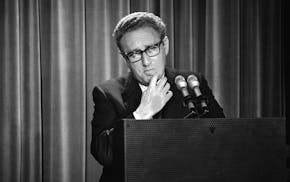Opinion editor's note: Strib Voices publishes a mix of guest commentaries online and in print each day. To contribute, click here.
•••
By first telling Ukraine's president, Volodymyr Zelenskyy, that Zelenskyy doesn't "have any cards," and then withholding U.S. intelligence and pausing military assistance to show his own cards, President Donald Trump has backed away from the Ukrainians just as Henry Kissinger turned on the South Vietnamese nationalists in January 1971.
The "success" of Kissinger's effort as President Richard Nixon's national security adviser occurred 50 years ago today.
Both men used the Russians to extricate Americans from supporting allies fighting aggression.
In casting adrift first South Vietnam and now the Ukrainians, Kissinger then and Trump now abandoned a noble and historic international order that the U.S. and its allies — Europe, Canada, Australia — had put in place after World War II to make aggressive wars illegal and to use right not might as the foundation for human civilization.
On Jan. 9, 1971, Kissinger meet in Washington with Soviet Ambassador Anatoly Dobrynin. According to Dobrynin's secret report to his Foreign Ministry in Moscow, Kissinger proposed:
- That the U.S. would commit to withdraw all of its troops by some absolutely specific deadline, of which they would inform the Vietnamese. (At the same time, the Americans could refrain from demanding a reciprocal withdrawal of North Vietnamese troops from South Vietnam.)
- That the North Vietnamese would commit to a ceasefire for the period of the U.S. troop withdrawal plus at least some brief amount of time after the withdrawal.
- That ultimately it would no longer be the American concern, but only that of the Vietnamese themselves, if sometime after the U.S. troop withdrawal they started fighting each other again.
Thus did Henry Kissinger walk away from the defense of South Vietnam.
The atrocious full story is told in my book "Kissinger's Betrayal: How America Lost the Vietnam War."
Kissinger did not report this proposal to Nixon, who did not learn of Kissinger's betrayal until I told him in 1989.
This proposal was secretly accepted by Hanoi on May 25, 1971 — a fact that Kissinger did not report to Nixon. It was formally put into a negotiation proposal presented to the Vietnamese Communists on May 31, 1971. Kissinger did not then demand the withdrawal of North Vietnamese divisions from South Vietnam and put on the record that the Americans would take no action if, after a peace treaty was signed, the North Vietnamese resumed warfare against South Vietnam.
Kissinger's proposal became the Paris Peace Agreement of January 1973 to end the war in South Vietnam with promises that the South Vietnamese would be free and independent.
True to its secret agreement with Kissinger, Hanoi waited two years before launching a military offensive to conquer South Vietnam. That offensive started exactly 50 years ago in early 1975, and Saigon fell to the invading communist forces on April 30, 1975, an event that the Minnesota Vietnamese community will be remembering this week.
The first Vietnamese Minnesotans arrived here 50 years ago as the morally dubious consequence of Kissinger's betrayal of their cultural heritage and country.
So, in a way, we have Henry Kissinger to thank for letting us come to enjoy pho soup and banh mi sandwiches here in the Twin Cities.
Also in 1975, following Kissinger's abandonment of South Vietnam, communists took power over Cambodia and Laos. Fleeing repression, the Hmong people in Laos also came to Minnesota as refugees. In Cambodia, the Khmer Rouge extinguished the lives of some 1.5 million of their own people. Some traumatized survivors also came here as refugees.
We also have many Minnesotans with Ukrainian origins or family connections. May they not have to live with another American abandonment, this time of their ancestral homeland.
Stephen B. Young, of St. Paul, is global executive director of the Caux Round Table for Moral Capitalism.
Burcum: Running toward, not away from, the battle over vaccines
Readers Write: Violence prevention, Minneapolis politics, Trump's first 100 days
Opinion: The U.S. and Vietnam, five decades on

